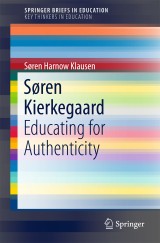Details

Søren Kierkegaard
Educating for AuthenticitySpringerBriefs in Education
|
64,19 € |
|
| Verlag: | Springer |
| Format: | |
| Veröffentl.: | 01.02.2018 |
| ISBN/EAN: | 9783319731865 |
| Sprache: | englisch |
Dieses eBook enthält ein Wasserzeichen.
Beschreibungen
<p>This book is a succinct guide to Søren Kierkegaard’s contribution to educational thought. Kierkegaard is not usually known as an educational thinker, but the book shows how his key notions and ideas are nevertheless highly relevant to educational theory and practice. It places them within the context of Kierkegaard’s philosophy and the philosophy of his time, while also exploring their significance to issues of contemporary concern, like the question of how far education should aim at fostering useful skills or support more ambitious goals. The central topics are Kierkegaard’s diagnosis of the limitations of objective knowledge and his corresponding emphasis on know-how, personal appropriation and subjective attitude; his analysis of more or less successful forms of self-realization; his ideas about fostering personal development through “indirect communication” and dialogue; and the elements, strengths and shortcomings of the ideal of self-cultivation (German <i>Bildung</i>). </p>
<p>Chapter 1: Existence and Education.- Chapter 2: Authenticity as Ideal and Idol.- Chapter 3: Self-Cultivation and Its Discontents.- Chapter 4: Dialogue and Indirect Communication.- Chapter 5: Needs and Dangers of Ambitious Educational Ideals.</p>
<p>This book is a succinct guide to Søren Kierkegaard’s contribution to educational thought. Kierkegaard is not usually known as an educational thinker, but the book shows how his key notions and ideas are nevertheless highly relevant to educational theory and practice. It places them within the context of Kierkegaard’s philosophy and the philosophy of his time, while also exploring their significance to issues of contemporary concern, like the question of how far education should aim at fostering useful skills or support more ambitious goals. The central topics are Kierkegaard’s diagnosis of the limitations of objective knowledge and his corresponding emphasis on know-how, personal appropriation and subjective attitude; his analysis of more or less successful forms of self-realization; his ideas about fostering personal development through “indirect communication” and dialogue; and the elements, strengths and shortcomings of the ideal of self-cultivation (German <i>Bildung</i>). </p>
Explicates Kierkegaard's otherwise fragmented and often merely implicit thoughts on education Elucidates the relationship between formal, informal and existential education Written in an accessible, informative style, free of philological subtleties and jargon
Diese Produkte könnten Sie auch interessieren:

Community Schools in Africa

von: Deborah Glassman, Chloe O'Gara, Kristin Helmore, Jordan Naidoo, Fred Wood

53,49 €















